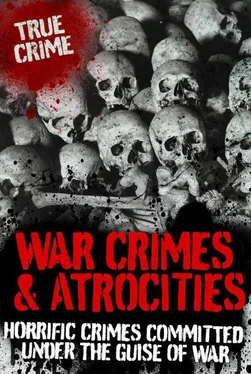The main target of aerial bombing in 2003 was the North Darfur state, which was the homeland of the Zaghawa. Sudanese government aircraft, mainly Antonov planes, although MiGs and helicopters were also used, repeatedly bombed towns and villages at any time of day and night, without any prior warning. The attacks continued into 2004, with a disproportionate use of force in areas where there possibly could have been rebels present, although they were predominantly inhabited by defenceless civilians.
The bombing forced many people to leave their villages and move into the wadis , tree-lined riverbeds, that are dry except when there is heavy rain. They dug wells with their hands to access water under the riverbeds. However, even in the wadis they were not safe from attack and were continually being targeted by both air and ground assaults. It was obvious that the bombing of the wadis was part of the government’s strategy to destroy the water supplies and other civilian institutions such as schools and hospitals.
The attacks spread to West and South Darfur, where Masaalit and Fur villages became the prime targets. At first, the attacks were carried out by armed Arab militia on either camels or horses and consisted mainly of theft of livestock and just verbal threats. However, as the months went by the attacks became worse, and by early 2004 they became more numerous and much more violent. Individuals have also reported that they were forced to pay the Janjaweed to allow them to return to their villages and farm their own land. However, once they return, their villages were attacked again or, in some cases, were already occupied by settlements of Arab nomads.
THE JANJAWEED
It is reported that the Sudanese government may have recruited as many as 20,000 Janjaweed militia to fight alongside their own army. Most of the Janjaweeed are believed to have come from Arab camel-herding tribes from North Darfur and Chad. Many of the tribesmen were attracted to the Janjaweed by the added incentive of looting. They have been described as wearing Sudanese government military uniforms, generally khaki in colour. Although they sometimes bear an insignia of a man on horseback, or a red patch on the shoulder, their ranks are generally broken up as regular government ranks, with the main leader taking the title of ‘general’. They are armed with the latest military weapons, and although typically ride on camels or horses, they have often been seen travelling in Sudanese government vehicles.
Members of the Human Rights Watch have been told by credible sources that Janjaweed can be paid US$100 to US$400 as an enrolment fee, and that their relatives are guaranteed continued support should any member of the militia be killed in battle. They are also given identity cards and regular food supplies, stipends and communications equipment.
There have been numerous reports of rape by the Janjaweed militia. One 18-year-old woman, the victim of a brutal racial attack, reported that the janjaweed had inserted a knife into her vagina saying, ‘You get this because you are black’. Young boys who worked as shepherds have allegedly been abducted from Abu Gamra by the Janjaweed and were then subjected to sexual abuse and forced into domestic labour. In February 2004, residents of the town of Tawila were attacked; 67 were killed and 41 schoolgirls and female teachers were raped. Following the rape, the women were supposedly branded on the back of their hands to permanently stigmatize them.
There have also been an alarming number of abductions of both young girls and boys, although it is not possible to obtain an accurate number. It is estimated that the numbers are likely to be in their hundreds, ranging in age from infants to adolescents. A 20-year-old Zaghara woman named Mecca Hissab, was shot to death by the Janjaweed when she tried to stop them from taking her three-year-old son. Three shepherd boys from the village of Jirai, aged 10, 12 and 13, were all shot to death when they tried to stop the Janjaweed from stealing their animals. A 12-year-old girl from the same area also disappeared at the time of the attack and has not been seen since.
The primary target of the Janjaweed looting has been livestock – thousands of camels, cattle, sheep and goats belonging to Fur, Masaalit and Zaghawa villagers. Throughout the whole region of Darfur the native population rely heavily on their livestock for survival. Livestock are not only used for trade but also for family consumption, and the impact of the theft on the lives and livelihoods of millions of people cannot be stressed strongly enough. Without any compensation for their losses, thousands of families have already been rendered destitute. Any civilians attempting to stop the militia from stealing their stock or looting their homes risked death or serious injury.
NO SAFE REFUGE
Exhausted, terrified and hungry, and with nowhere to go, the refugees fled by their hundreds of thousands to neighbouring Chad, a largely semi-desert country and Africa’s fifth-largest nation. However, like the Sudan, Chad has suffered from constant internal conflict. Poverty is rife and health and social conditions are inadequate, which is not helped by the influx of the refugees from Darfur. The refugees had a long and arduous journey of days, even weeks, travelling mainly at night to avoid attack. Deaths of their livestock and elderly family members have added to the general state of hopelessness felt by them. Hoping they would be safe once they crossed into Chad, the refugees didn’t find the safe haven they had expected. The area was littered with landmines and other unexploded devices from Chad’s own civil war in the 1970s. In some of the camps, up to 80 per cent of the refugees are children. Their fathers stayed behind to salvage what they could of their belongings or are believed to be dead. Some
of the men joined the rebel forces to try and overcome the militia.
Aid agencies are struggling to provide enough food, water and medical supplies, in what have been described as extremely difficult conditions. Disease is a problem and relief workers fear that the conditions will only get worse with the onset of the seasonal rains. Despite all these problems, the refugees’ main fear is their own safety, because even across the border they are not safe from the ravages of the militia and their own government.
In an effort to protect the refugees from cross-border raids, UNHCR, the UN refugee agency, has moved more than 31,000 Sudanese homeless deeper into eastern Chad. The Chadian military are often in conflict with Janjaweed who slip across the border to further harass the refugees and steal their livestock.
PEACE AGREEMENT
In 2005, the Sudanese government and southern-based rebels signed a peace agreement to end their 21-year war. However, despite this agreement, Sudan’s ruling party has failed to undertake the reforms that they promised to help end the human-rights abuses. There are concerns that the Sudanese government only entered into the peace agreement because it has already largely completed its programme of forced displacement. The UN fears that they will continue to manipulate humanitarian aid so that the refugees are forced to stay in the government-sponsored camps and be prevented from returning to their land and homes. Human Rights Watch have confirmed that the Janjaweed militia continued to control much of the rural area, imposing checkpoints and demands for payments on civilians trying to return to their land.
The UN called for an international commission of inquiry to establish the scale of the crimes against humanity in Darfur and the involvement of the Sudanese government in these atrocities. The US government eventually made a declaration of genocide after investigators had recorded the testimonies of over 1,136 refugees and displaced people from Darfur. The atrocities of Darfur have been described as ‘one of the most forgotten and neglected humanitarian cases’.
Читать дальше












